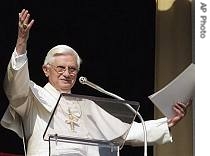2006年VOA标准英语-Pope Hopes Turkey Visit Will Lead to Useful Dia(在线收听)
By Sabina Castelfranco
Rome
03 December 2006
 Pope Benedict XVI gestures from his study window overlooking St. Peter's Square, 3 Dec 2006 |
||
Addressing pilgrims from his studio window overlooking Saint Peter's Square, the pope called his visit to Turkey "an unforgettable experience."
The pope returned to the Vatican on Friday, after spending four days in Ankara, Ephesus and Istanbul. His visit appeared to have gone some way toward improving relations with Muslims, whom the pope had angered when he made comments in September linking Islam to violence.
Benedict became the second pope ever to walk into a Muslim place of worship, when he visited the Blue Mosque in Istanbul. His visit was also focused on continuing efforts to reach out to Orthodox Christians.
The pope told pilgrims his visit to Turkey was "an unforgettable spiritual and pastoral experience, which I hope will produce the fruits for an increasingly sincere cooperation between all of Christ's disciples, and a useful dialogue with Muslims."
The pope also made a special mention of Turkey's small Catholic community. He said it often finds itself in situations that are not easy. During his visit to Turkey the pope called for improved rights for religious minorities.
Meanwhile, the Vatican criticized China, where the state-backed Patriotic Catholic Association ordained a bishop. It was the third ordination of a bishop this year in China without papal approval.
The Vatican said it was the latest in a "series of extremely grave acts" that caused Pope Benedict XVI "great sorrow."
China defended the ordination of the bishop, saying the Vatican's criticism was "unreasonable." The Chinese government views papal appointments as interference in its internal affairs.
Beijing has had no diplomatic ties with the Vatican since 1951, when the communists took power, and set up a separate Catholic church outside the authority of the Vatican.
Catholics in China are allowed to pray only with the state-sanctioned church. Millions, however, worship in underground churches.